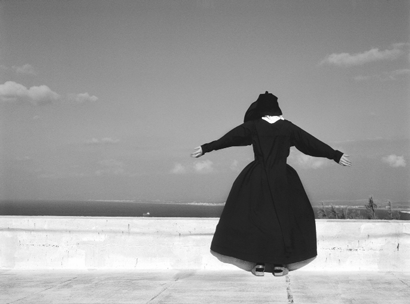By Aileen Torres
Women and their private spaces have become the trademark of Israeli Lili Almog’s work. As early as 1992, when she earned a degree in photography at the School of Visual Arts, she was inspired by art history and made collages referencing the depiction of women through time. Now an Upper West Sider, by way of Chelsea, she’s since stripped her methods down, and her ideas about women and the environments she chooses to shoot them in have come more to the fore.
Her latest show, through July 31 at the Andrea Meislin Gallery, which specializes in contemporary Israeli photography, is “Perfect Intimacy,” a photographic series of nuns in three Carmelite monasteries: one on Mt. Carmel in Haifa, one in Bethlehem and one in Port Tobacco, MD. The origins of the Carmelite Order lie with a group of hermits who gathered on Mount Carmel in present-day Israel, near the city of Haifa, which was recently hit with rockets from Hezbollah militants in Lebanon. The Villager’s Aileen Torres spoke with Almog before the violence erupted in her native country.
When did you begin ‘Perfect Intimacy’?
In the summer of 2003 I went to the Carmelite monastery in Haifa. The Carmelite order was founded in Israel, on Mt. Carmel, exactly where I was shooting. In the beginning it was really difficult because they put me in the guest quarter and they were in their own area, so I didn’t see them. They pray seven times a day. I started to come to the main chapel to be with them while they were praying. I was fascinated by their clothing and the closure and devoting yourself.
I decided to call this project ‘Perfect Intimacy’ because I realized they had this intimate relationship with God, with Christ—their husband—and this love, this kind of relationship with an abstract person, for me, it’s almost like [a] perfect intimate relationship.
When most people think about Israel, they don’t typically think about Catholic monasteries. They think about the Israeli-Palestinian conflict, and now the current crisis with Hezbollah. Your project brings a different side of Israel to the public eye.
Right. I grew up in Tel Aviv. In Tel Aviv, there are no churches. I never saw a church until I left. [But] there are hundreds of monasteries in Israel. Haifa is one exceptional city because I think it’s the only city [in Israel where] Arab Muslims and Arab Christians [and] the Israelis live really nicely together.
Did the nuns really accept you?
They did. I think they were also fascinated by the fact that I was Jewish. They told me that in Israel, I was the first Jew that ever slept in a monastery.
I was not allowed to go to Palestine because I’m Israeli-Jewish and it was the middle of Intifada. The nuns said, you should definitely go [to the Bethlehem monastery]. I said, are you crazy? They said, don’t worry. They dressed me like a nun, and we actually escaped to the border. We didn’t go through where the soldiers [are]. We had an Arab-Christian driver, and he took us to where I think the suicide bombers were. It’s where all the shooting used to be. The nuns shared my equipment so I wouldn’t look like I was carrying too much bags by myself. And it was really scary. Basically, they could kidnap or kill me. But, you know, when you go into the adventure, you just go.
What’s it like living in a monastery?
It’s almost like going to a retreat. After three days in a monastery I would be so relaxed. Also, it was the best environment to work because there are no distractions.
The experience of living with a society of women was pretty amazing. It’s almost like a utopia of a women-run society. They’re creative. They’re very intelligent.
Because I was visiting and I was from the outside, I’m sure that when I came, they were showing me their perfect life. Sometimes they would say, oh, don’t take a picture of me, because she was in an apron or something. They always wanted to look good, too, even though they are nuns. For me, it was like, okay, this is your stage, you play it the way you want to. It’s fine. I’ll get you the way you want me to get you. Because this is my thing [the representation of a woman by a woman]. This is my game. I like that.
How do you choose your subjects?
I’m not a political person, but I will go after my heart and my interest. It has [to have] a story. There always has to be something that will trigger me behind the face.
Your studio was in Chelsea when you were doing this project.
Yes. I was on W. 21st Street. I got my studio [in the] late ‘90s. I was sharing it. Rent went from $3,000 for the whole place to $10,000 to $12,000 in five, six years. [But] because I’m not shooting in the studio, I don’t [need it].
“Perfect Intimacy” was published by PowerHouse Books in April and is currently on exhibit through July 31 at the Andrea Meislin Gallery, 526 West 26th Street, Suite 214, (212-627-2552; www.andreameislin.com).







































